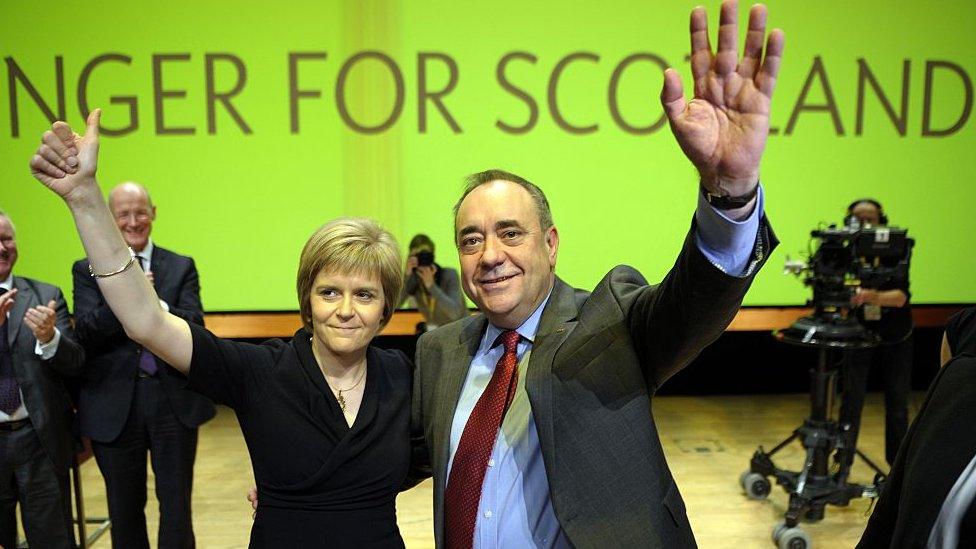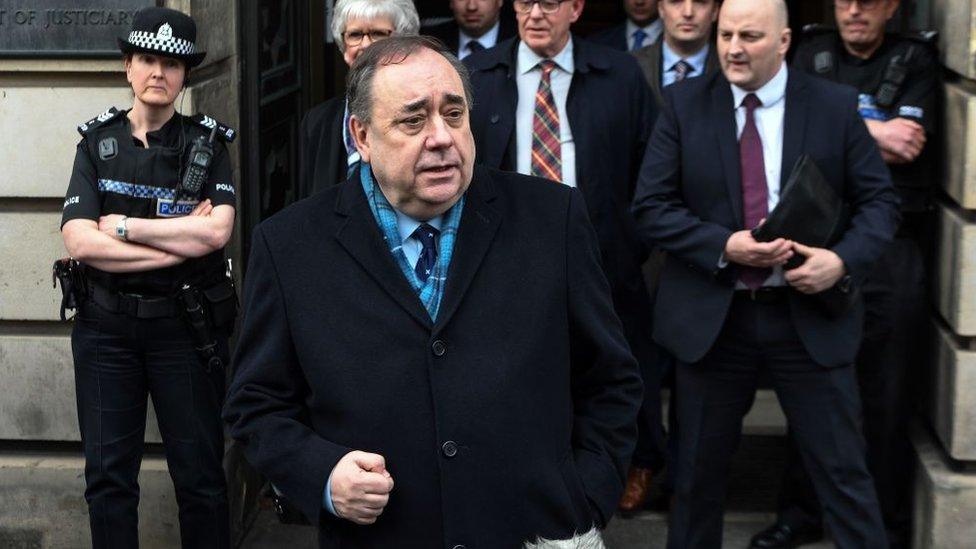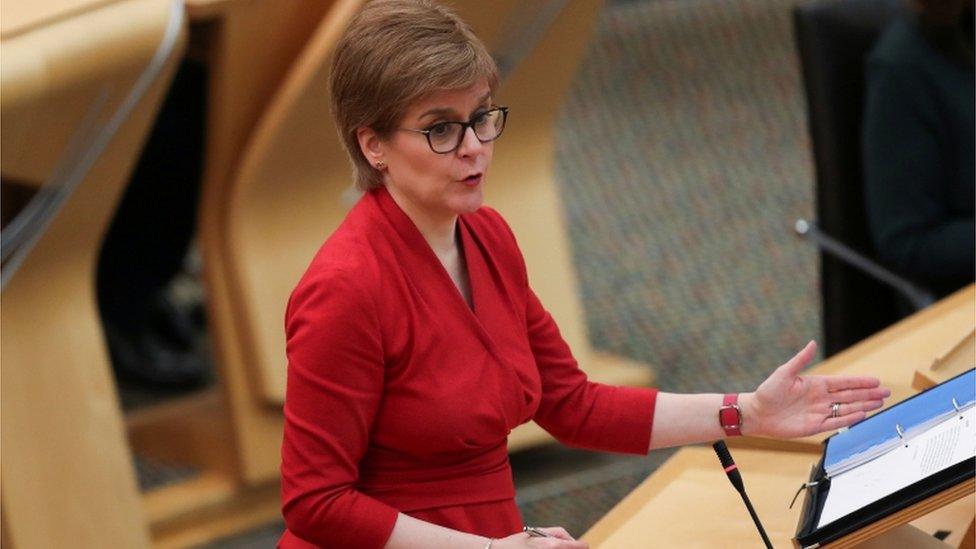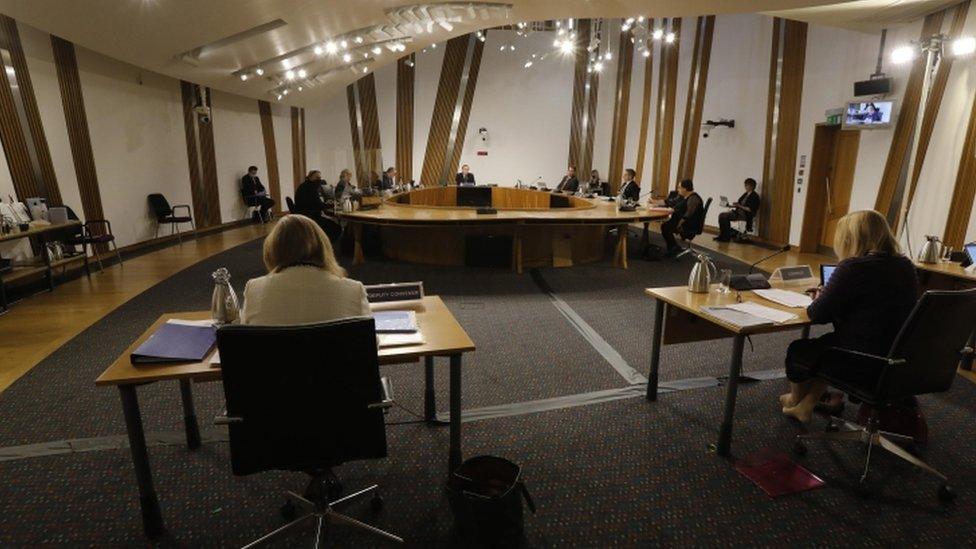Alex Salmond says there is 'no doubt' Nicola Sturgeon broke ministerial code
- Published
Alex Salmond: "I've got no doubt Nicola Sturgeon has broken the ministerial code."
Alex Salmond has said he has "no doubt" that Nicola Sturgeon has breached the ministerial code.
The former first minister was speaking as he made his long-awaited appearance at a Scottish Parliament inquiry.
Mr Salmond gave an account to the committee of meetings he had with Ms Sturgeon that appeared to contradict her version of events.
But he said it was not for him to say whether Ms Sturgeon should resign if she was found to have broken the code.
Ms Sturgeon denies breaching the code, and has accused Mr Salmond of creating "wild" conspiracy theories that are untrue.
Her spokesman said Mr Salmond had failed to prove his allegations in his evidence to the committee, and "also gave testimony which directly undermined some of the central planks of his conspiracy theories".
The inquiry is examining the Scottish government's botched handling of harassment allegations against Mr Salmond.
The government admitted it had acted unlawfully during its investigation into the initial complaints from two female civil servants after Mr Salmond launched a judicial review case, and had to pay his legal fees of more than £500,000.
Mr Salmond was arrested two weeks after the government admitted defeat in the civil case, and was later cleared of 13 charges of sexual assault against a total of nine women after a trial at the High Court last year.
He has previously accused people close to Ms Sturgeon - his successor as both first minister and SNP leader - of plotting against him, and has named Ms Sturgeon's husband, SNP chief executive Peter Murrell, as being one of them.
Mr Salmond told the committee that he had been given a memory stick in the build up to his criminal trial that contained messages which involved "pressuring police", "collusion of witnesses" and "construction of evidence because police were felt to be inadequate in finding it themselves".
He said he would "dearly love to provide" more detail about the messages - but was unable to do so because he was "under an injunction" that could see him prosecuted for revealing evidence that was given to him as part of the criminal proceedings.

Mr Salmond and Ms Sturgeon were close political allies for decades - but are now embroiled in a bitter war of words
Asked what the motivation would be for a plot against him, Mr Salmond said some in the Scottish government saw the judicial review case as a "huge, looming, enormous and difficult problem".
He said the potential impact on Ms Sturgeon and others in the government of a "disastrous" defeat in the civil case meant "it became very important that the criminal case overtook the judicial review".
Part of the written evidence submitted by Mr Salmond ahead of the committee meeting was removed on the request of the Crown Office earlier this week after it had already been published in full by the Scottish Parliament.
The submissions included claims that Ms Sturgeon misled parliament over when she first learned of the allegations against her former political mentor.


This was one of the most extraordinary episodes in Holyrood's short history.
In six hours of testimony, Scotland's longest serving first minister set out what he believes was a malicious plot against him by key figures in the SNP and the Scottish government - both of which he used to lead.
His voice cracked with emotion as he accused former colleagues of pressurising police and potential witnesses to build a criminal case against him - claims they deny.
He was not able to present the social media messages that he believes will prove this case but during his appearance the Scottish Parliament issued an order demanding their release by Scottish prosecutors.
For their parts in the botched handling of the original harassment complaints against him, Alex Salmond called for the resignation of Scotland's top civil servant and its top law officer.
But he stopped short of demanding his former ally, friend and political partner - Nicola Sturgeon - stand down despite arguing that she had repeatedly broken the rules for ministers.
He said her fate should be decided by others after she's given evidence next week and the inquiries into this toxic affair have delivered their verdicts.


Mr Salmond was cleared of all 13 charges of sexual assault against a total of nine women after a High Court trial in March of last year
Ms Sturgeon initially told parliament she had not learned of the complaints until she was informed by Mr Salmond on 2 April 2018.
However, she later claimed to have "forgotten" about an earlier meeting in her Scottish Parliament office on 29 March of that year, when she was told about the allegations by Mr Salmond's former chief of staff Geoff Aberdein.
Mr Salmond told the committee that if Ms Sturgeon had truly forgotten about the meeting, she should have corrected the record when she did remember.
But he said Ms Sturgeon had only admitted that the meeting had taken place after details of it were revealed 18 months later by Sky News.
He also said there was "no doubt" that the meeting with Mr Aberdein and subsequent meetings between Mr Salmond and Ms Sturgeon in her home were about government matters rather than SNP business, as she has claimed.

Ms Sturgeon denies breaching the code, and says any suggestions of a plot against Mr Salmond are untrue
This could potentially be another breach of the code, which says all government business and meetings should be recorded - but none of them were.
Mr Salmond also alleged that the name of one of the women who had made complaints about him was made known to Mr Aberdein ahead of his meeting with Ms Sturgeon.
Ms Sturgeon told parliament on Thursday that "to the very best of my knowledge I do not think that happened."
The first minister has also been accused of potentially breaching the code by allowing the government to continue opposing a civil court case brought by Mr Salmond over its handling of the initial complaints against him from two female civil servants.
Mr Salmond has alleged that the government was given legal advice that it was unlikely to win the case on 31 October 2018 - but did not concede defeat until January of the following year.
Mr Salmond said: "I have no doubt Nicola has broken the ministerial code, but it's not for me to decide what the consequences should be."
A separate inquiry headed by Irish lawyer James Hamilton is specifically looking at whether Ms Sturgeon breached the code, which states that any minister who deliberately misleads parliament would be expected to resign.
Mr Salmond said he was due to be interviewed by Mr Hamilton next week.


The last six hours have been detailed. Alex Salmond's complaints are numerous. But stand back from it for a second.
The former First Minister of Scotland has just accused his successor of breaking the ministerial code - and left open the door for her having to resign as a result.
He has said Scotland's most senior civil servant should quit - and that its most senior lawyer should consider his position.
Nicola Sturgeon's allies will argue he has not provided evidence for his claims of a plot against him.
But Ms Sturgeon will face huge questions when she appears before MSPs next week - some of the most difficult she has faced in her career.

The marathon evidence session - which lasted six hours - also saw Mr Salmond claim that the leadership of the Scottish government, civil service and Crown Office prosecution service had all "failed".
He said no one had taken responsibility for the "nightmare" he had been put through, and said the country's top civil servant, Leslie Evans should quit, and that the head of the Crown Office, Lord Advocate James Wolffe, should consider his position.
He also alleged that there had been a "deliberate suppression of information inconvenient to the government" throughout the saga.
And he called for a police investigation into how details of the complaints against him were leaked to the Daily Record newspaper, and said he believed the leak came from within the government and was politically motivated.
An Information Commissioner's Office investigation into the leak found no "hard evidence" that it came from the government - but said it had "some sympathy" to the view that it had.
Mr Salmond criticises the leadership of the civil service, the Crown Office and Scottish government
Mr Salmond went on to say he did not believe the House of Commons would accept a call from the Crown Prosecution Service in England to change a committee document, as the Scottish Parliament had done in response to the Crown Office request.
He said he had "no incentive or advantage in revisiting the hurt and shock of the last three years".
But he added: "We can't turn the page or move on until the decision-making which is undermining the system of government in Scotland is addressed."
He said the country's "move to independence" - which he has campaigned for throughout his political life - "must be accompanied by institutions whose leadership is strong and robust and capable of protecting each and every citizen from arbitrary authority".

The inquiry committee has been badly delayed, with some members claiming it has faced deliberate obstruction from both the government and Mr Salmond
Ms Sturgeon has denied there was any conspiracy against Mr Salmond, and has said she is "relishing" the prospect of giving evidence to the committee next week.
Answering questions from journalists at her daily coronavirus briefing on Wednesday, she said: "I don't think there is a shred of evidence behind those allegations and the claims that have been made".
She claimed that Mr Salmond had created an "alternative reality in which the organs of the state - not just me, the SNP and the civil service and the Crown Office and the police and women who came forward - were all part of some wild conspiracy against him for reasons I can't explain".
And she added: "Maybe that's easier than just accepting that at the root of all this might just have been issues in his own behaviour."
A spokeswoman for the government said Ms Evans continued to have the support of the first minister and would not be resigning as the head of the civil service in Scotland.
The spokeswoman also said the government had a "duty to investigate the serious and specific complaints against Alex Salmond and was right to do so".
She added: "As set out in detailed evidence to the committee, all government decisions were informed by legal advice and taken in line with the Civil Service Code."
A spokesman for the Crown Office said: "Scotland's prosecutors have acted independently and in the public interest at all times when considering matters related to this case."
The Lord Advocate will give evidence to the committee on Monday, before Ms Sturgeon - who will be the final witness - appears on Wednesday.